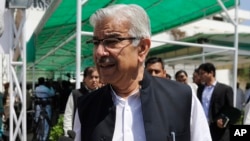Pakistan insisted on Friday that the Afghan peace and reconciliation process is ongoing and that the death of the leader of Afghanistan’s Taliban insurgency, Mullah Omar, has only caused a temporary pause.
In a policy statement in the National Assembly, Defense Minister Khawaja Asif again dismissed allegations that the reclusive Taliban chief’s death occurred in Pakistan.
“I want to reiterate that Mullah Omar neither died nor was he buried in Pakistan. Whether he died now or earlier, this is also a controversy and we don’t want to be involved in it,” Asif said.
Afghan authorities last week disclosed that Omar died in a hospital in the Pakistani city of Karachi in April 2013.
The announcement came a day before Pakistan was to host a second round of peace talks between Afghan and Taliban negotiators. The disclosure prompted the Taliban to pull out of the dialogue, throwing the nascent peace process into turmoil. The ensuing struggle within Taliban ranks for the new leadership fueled those fears.
New leader faces opposition
The Taliban has chosen Omar’s deputy Mullah Akhtar Mansoor as its new leader, but he is facing opposition from senior leaders within the Islamist group and they have refused to swear allegiance to Mansoor.
The Pakistani defense minister said that reported leadership rivalry is an internal mater of the Taliban and his country does not want to be involved in this controversy either.
He insisted that the Afghan peace dialogue has been “postponed and not abandoned” and Pakistan is making efforts to get it resumed soon.
“It is our earnest desire that this process continues. Our efforts are that whichever leadership [of the Taliban] emerges that leadership continues with the process of peace and reconciliation with the Afghan government so that lasting peace can be established in the region.”
Pakistan brokered and hosted the inaugural round of peace talks between Afghan and Taliban delegates on July 7 in the tourist resort town of Murree. American and Chinese officials also attended the meeting as “observers”.
Taliban, spy agency link?
It is widely believed that key Taliban leaders have taken refuge in Pakistan and allegedly take instructions from the country's spy agency.
Defense Minister Asif again rejected those charges, saying Pakistan does not control the Taliban but is using its limited influence with the insurgent group to bring it to the negotiating table.




